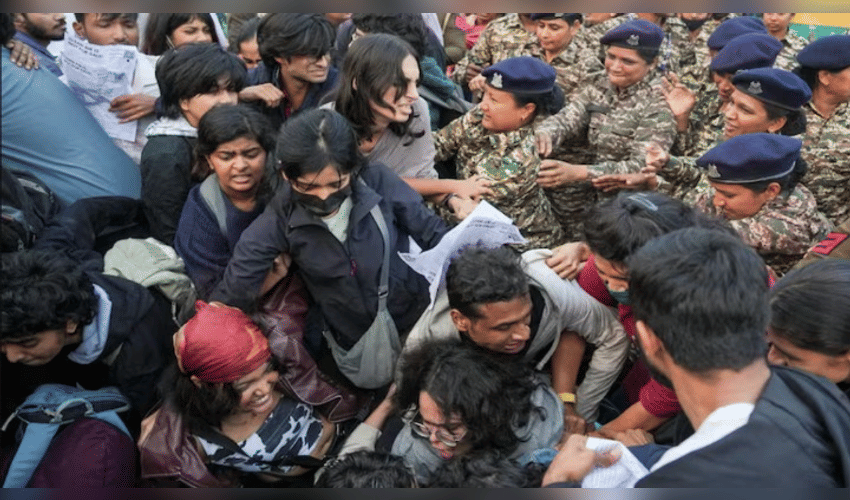News
Delhi Toxic Air Protest Turns Chaotic: Chilli Spray Used, 'Madvi Hidma' Slogans Raised, 15 Arrested

A protest against Delhi’s worsening air pollution at India Gate on Sunday evening took an unexpected and alarming turn when it escalated into violence. What started as a peaceful demonstration to demand serious government action against the city’s toxic air soon became chaotic, marked by clashes with police and controversy over some protesters raising slogans supporting the slain Maoist leader Madvi Hidma. The situation further deteriorated when some demonstrators allegedly used chilli spray against police personnel trying to clear the protest site, resulting in injuries and arrests.
The protest gathered a sizable crowd, including members of the Delhi Coordination Committee for Clean Air and student activists, who accused the authorities of relying on superficial measures like water sprinkling and cloud seeding to tackle pollution instead of addressing root causes. They sat on the road within the India Gate area without permission, blocking access and disrupting emergency services, notably ambulances. Police repeatedly requested the protesters to disperse, but tensions rose as activists refused to move and began chanting slogans like “Madvi Hidma Amar Rahe” (Long Live Madvi Hidma), honoring the Maoist commander recently killed in Andhra Pradesh. The slogans and posters linking environmental struggles with the Maoist resistance sparked outrage among officials and political leaders, who vowed to take strict legal action against those involved.
The protest turned violent when some demonstrators sprayed chilli powder at the police attempting to clear the road. Several officers suffered injuries, requiring treatment at Ram Manohar Lohia Hospital. Police acted swiftly, making at least 15 arrests related to the violence and assault on government personnel. The authorities condemned the use of violent tactics and the Maoist slogans, affirming that the protesters who fomented unrest would be held accountable.
This tumultuous episode highlights the frustration and desperation among citizens facing Delhi’s dangerously high pollution levels, with the Air Quality Index repeatedly hitting “severe” categories above 400. While the protesters’ grievances about broken promises and ineffective measures resonate widely, the turn to violence and controversial political slogans complicated the narrative. Experts suggest that addressing Delhi’s pollution crisis requires not only immediate relief efforts but also a long-term commitment to sustainable urban planning, stricter industrial regulation, better public transport, and enhanced green cover.
Delhi’s toxic air protest reflects deep public anger but also raises questions about protest strategies and messaging in highly charged political environments. The government’s response will be closely watched, as calls grow louder for both cleaner air and respectful, peaceful civic engagement to bring about meaningful environmental change.



